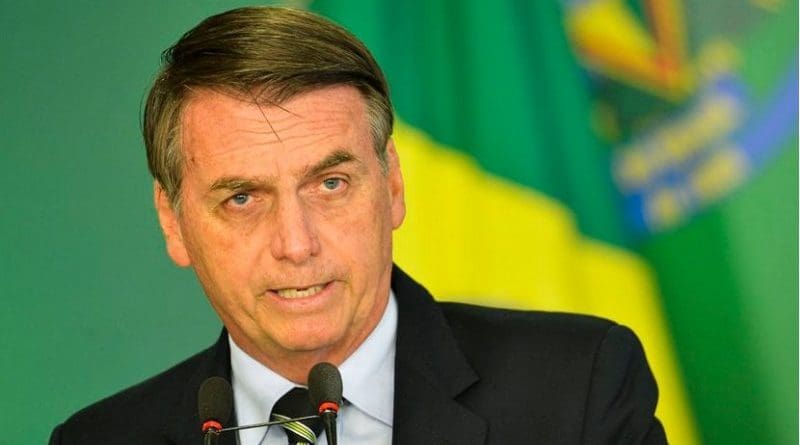Brazil Faces Big Moment If Bolsonaro Is Voted Out – OpEd
By Arab News
By Andrew Hammond*
Brazil goes to the polls on Sunday, but it is more than the key presidential candidates on the ballot. This is because, after the controversies of the last few years, the election offers Brazil, as a nation, the opportunity to restore international trust and enter a new political era should President Jair Bolsonaro lose power. Bolsonaro — sometimes known as the “Tropical Trump” — has been a key part of the populism phenomenon that has swept the world in recent years.
As populism in South America tends to be of the left-of-center variety, what has been unusual about Bolsonaro’s period of rule is that he has been stridently right wing. Not only has he brought in policies that have shocked global opinion, such as the intensification of deforestation in the Amazon, but he has also attacked democratic institutions, including the Supreme Court, after it acted to curb his most anti-democratic moves.
There is even doubt whether he will accept the result if he loses the forthcoming election. Since winning the election in 2018, Bolsonaro has repeated accusations of electoral fraud without any evidence. Brazil has had electronic voting machines since 1996 and no systematic fraud has ever been recorded.
During his recent visit to the UK to attend Queen Elizabeth II’s funeral, Bolsonaro said that, if he received less than 60 percent of the votes, then “something abnormal has happened” in the electoral court responsible for counting the votes. Yet, in polling in 2022, he has never surpassed 35 percent and is typically about 10 percentage points behind former president Luiz Inacio Lula da Silva.
So, interest in who takes power in Brazil — whether Bolsonaro or da Silva — is going to be high. And there is a growing sense that the election, should da Silva win, could begin the path toward rebuilding Brazil’s damaged democratic institutions. Brazil is badly in need of a brand makeover and the 2022 elections could enable this.
As Brazilians prepare to cast their votes, recent surveys suggest that 76-year-old da Silva may be pulling further ahead and nearing the 50 percent threshold needed to win the election outright in the first round. While a first-round da Silva victory is plausible, other polls have indicated that the race may be much closer.
Should da Silva emerge victorious, he has highlighted that a key goal is to restore an image of Brazil to the world as a modern, vibrant democracy and stable emerging market that is a prime destination for investment and tourism. He has asserted that Brazil “can be a great country.”
Two major questions arise from the pivot point that Brazil now finds itself at. Firstly, can a country’s reputation be enhanced in the same way as that of a corporate or other organization? And, secondly, can this have a significant, sustainable national social and economic impact?
On the first issue, competition for the attention of stakeholders like investors and tourists is intensifying and national reputation can therefore be a prized asset or a big liability, with a direct effect on future political, economic and social fortunes. Boosting a country’s reputation is therefore an ongoing ambition in what is an overcrowded global information marketplace. A number of countries have successfully used key elections to rejuvenate themselves, including Spain after its transition to democracy following the Franco dictatorship. However, the simple fact is that many nations fail to fully capitalize, reputationally or economically, on such major political moments.
To maximize the prospects of Brazil benefiting, reputationally, in the midst of the country’s current malaise, it must pursue a concerted reputational and economic strategy that aligns all key national stakeholders around a single, coherent vision for its country brand. This exercise should not just be the preserve of government, but must involve the private and third sectors too.
A key part of this must be connecting the end of Bolsonaro’s rule, if indeed that is what happens at the election, to a wider story that showcases Brazil’s strengths so as to increase the favorability of international perceptions of the country, politically, economically and socially. Major positives here include the fact that Brazil is a vibrant, diverse, multicultural state that has the potential to kick off its long-standing tag as a “sleeping giant” to become a regional superpower, fueled by its status as one of the world’s largest countries by area and population.
Brazilian decision-makers would do well to act on this fast as they seek to capitalize on the opportunities that are on the horizon. In the midst of the hurly-burly of the next few days and weeks, the long-term opportunities of this election should not be sidelined. In the midst of its current troubles, Brazil could have a significant opportunity to use this latest democratic moment for a positive brand makeover that might produce a lasting legacy.
• Andrew Hammond is an Associate at LSE IDEAS at the London School of Economics.

